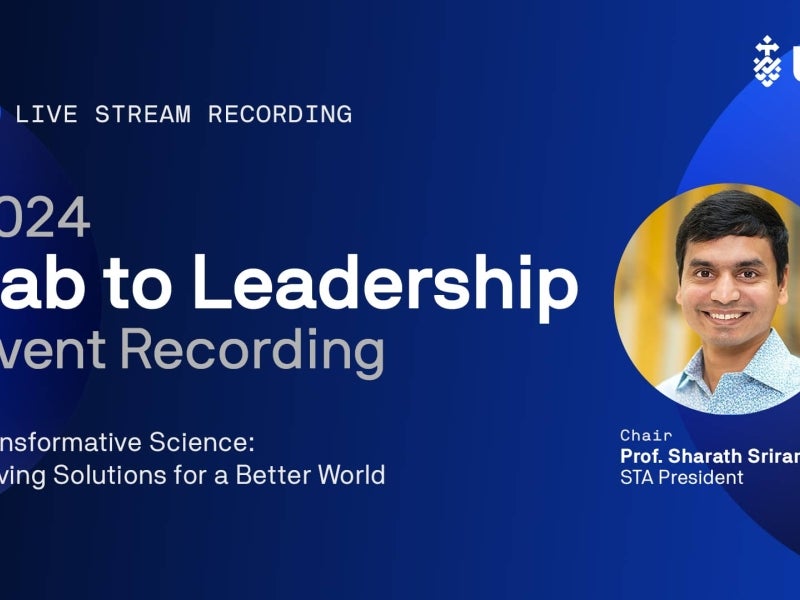Q&A with experts: How science leaders can drive outcomes for a better world

Australia was famously called the lucky country for its abundant natural resources. However, this reliance has led to a less diverse economy, ranking 93rd in the world for economic complexity.
Imagine Australia coming 93rd at the Olympics. There would be an outcry. So why does our ranking for diversification and innovation barely raise a whisper?
Speaking at Lab to Leadership, a recent event hosted by UTS Online, scientist Sharath Sriram spoke about the crucial need for Australia to pivot towards a more diversified and innovation-driven economy.
“We’re extremely good at the science we do in Australia. We produce 3 to 4 per cent of the world’s publications with 0.3 per cent of the world’s population,” Sriram said. “But how do we actually draw value from it for the country and place scientific innovation in people’s hands? That’s the biggest challenge.”
During the event, industry leaders shared their perspectives on how science leaders can drive outcomes for a better world.
The discussions highlighted the significance of interdisciplinary approaches, merging science, technology, health and business to address complex global issues, from sustainable energy to clinical trials.
The event also featured exclusive insights from notable industry speakers in the medical science and sustainable energy sectors, including:
- Sharath Sriram, a materials science and electronics expert who also serves as the President of Science and Technology Australia and leads the Functional Materials and Microsystems Research Group at RMIT University. His work focuses on transforming discoveries in material science into practical applications.
- David Langford, the Chair of the Industry Advisory Board at UTS Faculty of Science, who has extensive experience in corporate general management and investment banking. He has played significant roles in organisations like Optus and brings a wealth of expertise in business strategy and organisational management.
- Katharine Hole, CEO of the Association for the Battery Recycling Industry, has built her expertise in government and industry. With a background in economics and Asian studies, she has been instrumental in policy development and managing technological advancements in energy markets and battery technology.
- Kylie Readman, the Deputy Vice Chancellor of Education and Students at UTS, has a rich background in education, having held leadership roles at various universities. Kylie focuses on innovative, evidence-based approaches to enhance and support student success.
- Duncan Macinnis, Director of Stakeholder Engagement at MTP Connect, bridges the gap between advances in medical research and product development. With a PhD in molecular biology and microbiology, he helps companies, from startups to multinationals, commercialise their innovations.
Together, these experts provided a roadmap for aspiring science leaders to navigate their careers and make meaningful contributions to global challenges.
Why do we need scientists to be leaders in industry, government and the not-for-profit sector?
Science leaders have unique problem-solving perspectives, grounded in evidence-based approaches and creative thinking. These can be leveraged to revolutionise industry, government and not-for-profits.
As Sriram highlighted at the Lab to Leadership event, integrating scientific thinking into policymaking and business strategies can have transformative power.
“Leadership solves the big problems of today, tomorrow and beyond,” he said. “Scientists are trained to look at data, analyse it and make evidence-based decisions. They can create structured solutions for upcoming challenges, using their skills to deliver evidence-based policies and inspire the next generation of leaders.”
David Langford emphasised the problem-solving abilities scientists bring to leadership roles. His corporate general management and investment banking background has allowed him to apply scientific thinking to business strategies and enhance organisational outcomes.
Katharine Hole, CEO of the Association for the Battery Recycling Industry, shared her views on the indispensable role of science in managing technological advancements.
“Science is an absolute must-have, especially with technology being rolled out extensively and causing challenges in the waste sector with fires,” she noted. “Managing safe storage and handling is new territory and we rely on scientific evidence to guide us. Even if there are failures or gaps in knowledge, science sets the parameters and shapes our policy responses. It’s absolutely critical.”
What is different about scientific thinking in those roles that will be important for leadership challenges?
The ability to think scientifically – rigorously, analytically and creatively – is a game-changer for leadership, especially in roles that require innovative solutions to complex problems.
“Science is important for leadership for two key reasons,” Duncan Mcinnis said. ”We need scientists to be leaders because organisations are dynamic organisms that require an understanding of how relationships work between people and other factors. Products are often driven by innovations resulting from scientific discoveries.”
Macinnis believes including scientists in the product development process is particularly useful for commercialisation and innovation. “Scientists bring a particular way of thinking, understanding and training. To understand solutions best, we really need to understand the problem and that’s what scientists can bring,” he said.
“If we reflect on our most recent major global challenge over the last four years and particularly mRNA vaccines – a class of therapeutics that didn’t exist four years ago – in terms of understanding how we utilise those and how we invest appropriately, scientists bring that technical understanding that allows us to really bring those to the fore and use them as they need to be used,” he added.
“The Australian Federal Government is investing in the National Reconstruction Fund to develop Australia as a knowledge economy,” Macinnis continued. “To do that, we need scientists in the boardroom, not-for-profits and governments who understand how to apply science to drive new industry and the Australian economy.”
David Langford suggested scientific leadership is strategically crucial to driving economic growth.
“Science leadership is key to repositioning Australia’s economy from a value-adding perspective. Australia’s been great at utilising its physical resources in the ground, but we need to add additional value to them to capture economic upsides in a global market. I think science leadership is key to repositioning Australia’s growth for the future. And it’s also key to delivering a great educational experience and student outcomes,” he stated.
What do you think about UTS’s current courses that are working toward shifting thinking from lab to leadership?
UTS has been at the forefront of developing programs to transition scientists from the lab to the boardroom, equipping graduates to tackle the world’s most pressing issues.
“The UTS suite of postgraduate science courses are particularly valuable for early-stage innovators,” Macinnis said. “These people have discovered a great idea, solid science or a cool new widget and want to commercialise it. The science is great, but what makes a commercially successful product isn’t just the science.”
“How is regulation going to work? How is it going to get paid for? Who is the customer? What is the competition? What will the competition do when you bring in this new product? What is the patent position? What does your IP lawyer say?” He continued, “The science is super important, but the value of a course like this, learning these leadership skills, is understanding there’s more to commercialisation than just the science.”
Duncan Macinnis also stressed translating research into real-world applications. “Our mission is to bridge the gap between innovations in medical science and product development. It’s unrealistic to expect doctors and academic researchers to turn their discoveries into market-ready products alone. We need specialists who can navigate business and science to bring innovations to fruition. This is why MTP Connect exists and it’s where UTS excels,” he noted.
Macinnis commended UTS for its dual focus on scientific excellence and practical application. “Science is the foundation, but understanding the commercialisation process is equally critical. UTS’ holistic approach ensures students aren’t just knowledgeable – they’re prepared to lead their innovations to market success,” he said.
The experts agreed UTS is cultivating a new breed of science leaders equipped to drive innovative solutions on a global scale by offering courses that blend cutting-edge scientific knowledge with leadership training.
“Understanding the drivers of change and how fundamental science impacts the need for innovation is crucial. That’s why scientific leadership is indispensable for repositioning Australia’s economy from merely extracting resources to adding substantial value,” explains Langford.
Kylie Readman, Deputy Vice Chancellor of Education and Students at UTS, emphasised the role curiosity plays in driving scientific inquiry and leadership. “Curiosity has moved us forward in incredible ways, so leaders must hold onto that,” she states.
“UTS leaders are always pushing the boundaries of what learning looks like and taking it into a global environment beyond Sydney and Australia is crucial. I’m in awe of the people who designed these programs because they will significantly impact leadership in science and beyond, influencing all aspects of society that utilise science for good decision-making,” Readman added.
Ready to be at the forefront of global change?
Do you dream of using science to create a better world? UTS Online's science courses equip you with the knowledge, leadership and practical skills to tackle global challenges today and tomorrow.
These programs don’t just teach you science. They prepare you to lead global innovation and development, and inspire change on an international scale.
Becoming a science leader is more than gaining credentials; it’s about embracing a path filled with unique opportunities to influence and shape the future. UTS Online’s science leadership programs help you break down ambitious goals, seamlessly integrate education with your professional life and strategically build a network that amplifies your impact.
Imagine leading initiatives that redefine modern healthcare, sustainability, technology and beyond. By choosing UTS Online, you position yourself at the forefront of driving meaningful, global change. You empower yourself with the tools and insights to turn visionary ideas into reality.
You can hear more from our experts by visiting our Lab to Leadership event recording.
Ready to make a meaningful impact as a science leader? Explore UTS Online postgraduate science courses and unlock your potential in science leadership.
Get in touch with our Student Enrolment Advisors today on 1300 477 423 or learn more on our website.




